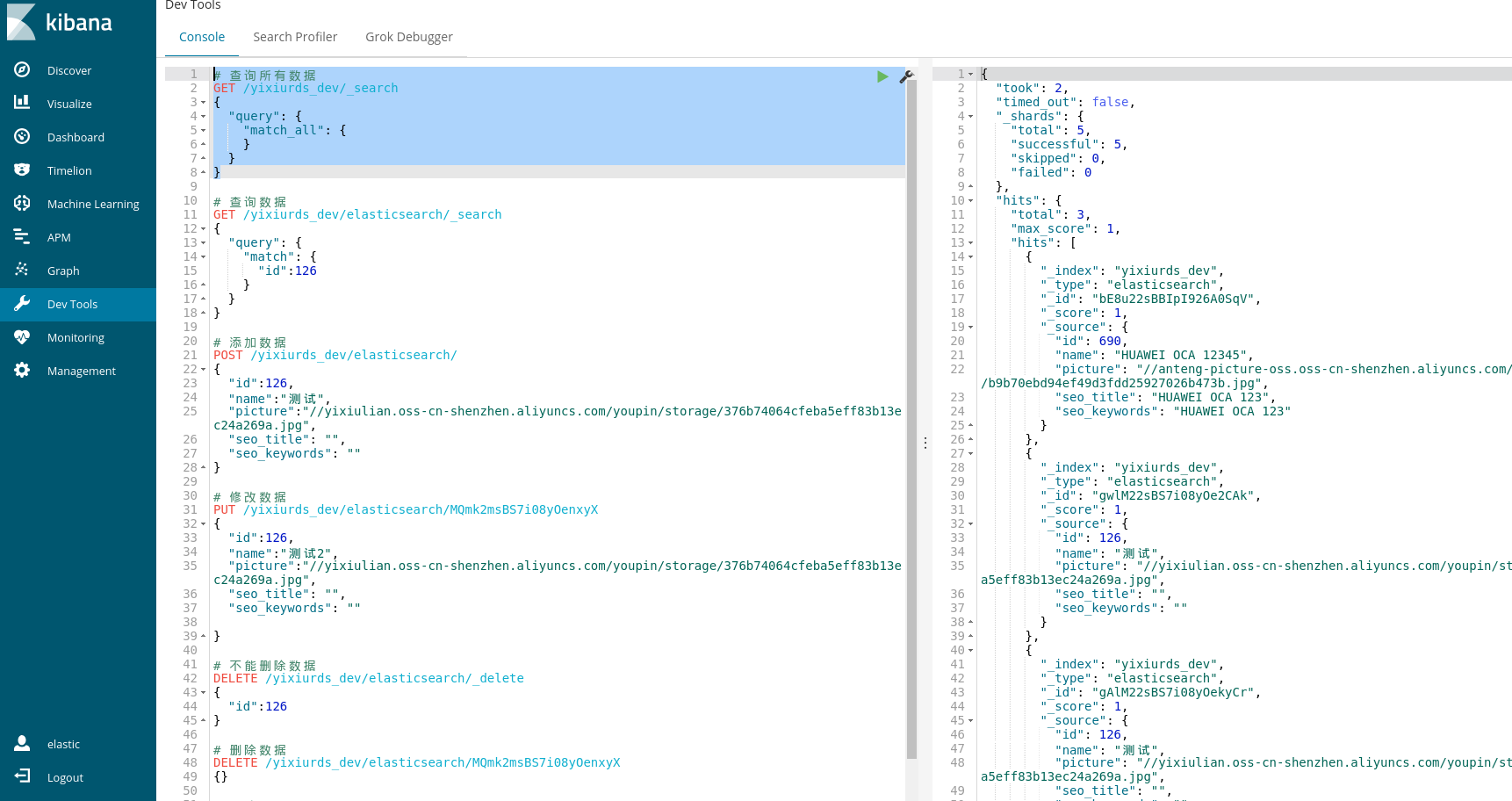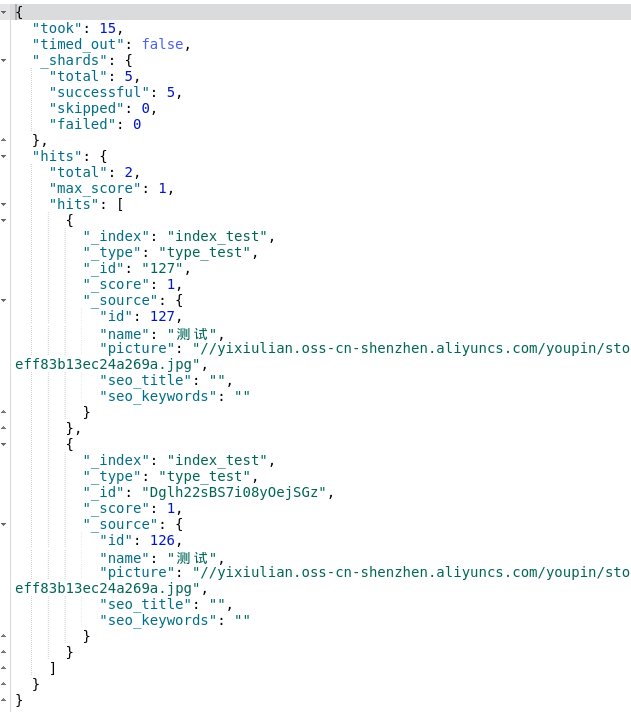阿里云 elasticsearch 增删改查
kibana 控制台

# 查询所有数据
GET /yixiurds_dev/_search
{
"query": {
"match_all": {
}
}
}
# 查询数据
GET /yixiurds_dev/elasticsearch/_search
{
"query": {
"match": {
"id":126
}
}
}
# 添加数据
POST /yixiurds_dev/elasticsearch/
{
"id":126,
"name":"测试",
"picture":"//yixiulian.oss-cn-shenzhen.aliyuncs.com/youpin/storage/376b74064cfeba5eff83b13ec24a269a.jpg",
"seo_title": "",
"seo_keywords": ""
}
# 修改数据
PUT /yixiurds_dev/elasticsearch/MQmk2msBS7i08yOenxyX
{
"id":126,
"name":"测试2",
"picture":"//yixiulian.oss-cn-shenzhen.aliyuncs.com/youpin/storage/376b74064cfeba5eff83b13ec24a269a.jpg",
"seo_title": "",
"seo_keywords": ""
}
# 不能删除数据
DELETE /yixiurds_dev/elasticsearch/_delete
{
"id":126
}
# 删除数据
DELETE /yixiurds_dev/elasticsearch/MQmk2msBS7i08yOenxyX
{}
# 删除索引
DELETE /yixiurds_dev
# 创建索引
PUT /yixiurds_dev
代码示例
@Component
public class ElasticsearchUtils {
private static final Logger logger = LoggerFactory.getLogger(ElasticsearchUtils.class);
private static String elasticHostName;
private static String elasticUserName;
private static String elasticPassword;
private static String elasticIndex;
private static RestClient restClient;
private static RestClient getRestClient() {
if (restClient == null) {
synchronized (ElasticsearchUtils.class) {
if (restClient == null) {
CredentialsProvider credentialsProvider = new BasicCredentialsProvider();
credentialsProvider.setCredentials(AuthScope.ANY, new UsernamePasswordCredentials(elasticUserName, elasticPassword));
restClient = RestClient.builder(new HttpHost(elasticHostName, 9200))
.setHttpClientConfigCallback(httpClientBuilder -> httpClientBuilder.setDefaultCredentialsProvider(credentialsProvider)).build();
}
return restClient;
}
} else {
return restClient;
}
}
/**
* 更新搜索的商品
*/
public static void updateGoodsList(List<Goods> goodsList) {
RestClient restClient = getRestClient();
goodsList.forEach(goods -> {
GoodsEsResp goodsEsResp = getGoods(goods.getId());
List<String> esIds = goodsEsResp.getEsIds();
if (CollectionUtils.isEmpty(esIds)) {
return;
}
esIds.forEach(esId -> {
String method = "PUT";
String endpoint = "/" + elasticIndex + "/elasticsearch/" + esId;
HttpEntity entity = new NStringEntity(
"{\n" +
" \"id\" : " + goods.getId() + ",\n" +
" \"name\" : \"" + goods.getName()+ "\",\n" +
" \"picture\" : \"" + goods.getPicture() + "\",\n" +
" \"seo_title\" : \"" + goods.getSeoTitle() + "\",\n" +
" \"seo_keywords\" : \"" + goods.getSeoKeywords() + "\"\n" +
"}", ContentType.APPLICATION_JSON);
Response response = null;
try {
response = restClient.performRequest(method, endpoint, Collections.<String, String>emptyMap(), entity);
logger.info(JSON.toJSONString(response));
} catch (IOException e) {
logger.error(e.toString());
}
});
});
}
/**
* 添加搜索的商品
*/
public static void addGoodsList(List<Goods> goodsList) {
RestClient restClient = getRestClient();
goodsList.forEach(goods -> {
String method = "POST";
String endpoint = "/" + elasticIndex + "/elasticsearch/";
HttpEntity entity = new NStringEntity(
"{\n" +
" \"id\" : " + goods.getId() + ",\n" +
" \"name\" : \"" + goods.getName()+ "\",\n" +
" \"picture\" : \"" + goods.getPicture() + "\",\n" +
" \"seo_title\" : \"" + goods.getSeoTitle() + "\",\n" +
" \"seo_keywords\" : \"" + goods.getSeoKeywords() + "\"\n" +
"}", ContentType.APPLICATION_JSON);
Response response = null;
try {
response = restClient.performRequest(method, endpoint, Collections.<String, String>emptyMap(), entity);
logger.info(JSON.toJSONString(response));
} catch (IOException e) {
logger.error(e.toString());
}
});
}
/**
* 删除搜索的商品
*/
public static void delGoodsList(List<Goods> goodsList) {
RestClient restClient = getRestClient();
goodsList.forEach(goods -> {
GoodsEsResp goodsEsResp = getGoods(goods.getId());
List<String> esIds = goodsEsResp.getEsIds();
if (CollectionUtils.isEmpty(esIds)) {
return;
}
esIds.forEach(esId -> {
String method = "DELETE";
String endpoint = "/" + elasticIndex + "/elasticsearch/" + esId;
HttpEntity entity = new NStringEntity(
"{}", ContentType.APPLICATION_JSON);
Response response = null;
try {
response = restClient.performRequest(method, endpoint, Collections.<String, String>emptyMap(), entity);
logger.info(JSON.toJSONString(response));
} catch (IOException e) {
logger.error(e.toString());
}
});
});
}
/**
* 获取搜索的商品
*/
public static GoodsEsResp getGoods(Long goodsId) {
GoodsEsResp goodsEsResp = new GoodsEsResp();
RestClient restClient = getRestClient();
String method = "GET";
String endpoint = "/" + elasticIndex + "/elasticsearch/_search";
HttpEntity entity = new NStringEntity("{\n" +
" \"query\": {\n" +
" \"match\": {\n" +
" \"id\":" + goodsId + "\n" +
" }\n" +
" }\n" +
"}", ContentType.APPLICATION_JSON);
Response response = null;
try {
response = restClient.performRequest(method, endpoint, Collections.<String, String>emptyMap(), entity);
JSONObject jsonObject = JSON.parseObject(EntityUtils.toString(response.getEntity()));
Object hits = jsonObject.get("hits");
JSONArray jsonArray = (JSONArray) ((JSONObject) hits).get("hits");
List<String> esIds = new ArrayList<>();
jsonArray.forEach(o -> {
String esId = (String) ((JSONObject) o).get("_id");
if (StringUtils.isNotBlank(esId)) {
esIds.add(esId);
}
});
goodsEsResp.setEsIds(esIds);
logger.info(JSON.toJSONString(response));
} catch (IOException e) {
logger.error(e.toString());
}
return goodsEsResp;
}
public String getElasticHostName() {
return elasticHostName;
}
@Value("${aliyun_elasticsearch_host}")
public void setElasticHostName(String elasticHostName) {
ElasticsearchUtils.elasticHostName = elasticHostName;
}
public String getElasticUserName() {
return elasticUserName;
}
@Value("${aliyun_elasticsearch_username}")
public void setElasticUserName(String elasticUserName) {
ElasticsearchUtils.elasticUserName = elasticUserName;
}
public String getElasticPassword() {
return elasticPassword;
}
@Value("${aliyun_elasticsearch_password}")
public void setElasticPassword(String elasticPassword) {
ElasticsearchUtils.elasticPassword = elasticPassword;
}
public String getElasticIndex() {
return elasticIndex;
}
@Value("${aliyun_elasticsearch_index}")
public void setElasticIndex(String elasticIndex) {
ElasticsearchUtils.elasticIndex = elasticIndex;
}
}
指定ID代替自动生成的_id可以节省一次查询
# 添加数据
POST /index_test/type_test/127
{
"id":127,
"name":"测试",
"picture":"//yixiulian.oss-cn-shenzhen.aliyuncs.com/youpin/storage/376b74064cfeba5eff83b13ec24a269a.jpg",
"seo_title": "",
"seo_keywords": ""
}
查询所有:

# id查询数据
GET /index_test/type_test/127
批量同步
DataWorks定时同步数据库的数据到ES
一个index 对应多个type:
PUT /index_test4
{
"mappings":{
"type_1":{
"_all" : {"enabled" : true},
"properties":{
"field_1":{ "type":"string"},
"field_2":{ "type":"long"}
}
},
"type_2":{
"properties":{
"field_3":{ "type":"string"},
"field_4":{ "type":"date"}
}
}
}
}
阿里云 elasticsearch 增删改查的更多相关文章
- elasticsearch增删改查crudp-----1
Elasticsearch一些增删改查的总结 环境Centos7+Es 5.x 简单介绍下ES的原理: 1,索引 --相当于传统关系型数据库的database或schema 2,类型 --相当于传 ...
- elasticsearch 增删改查底层原理
elasticsearch专栏:https://www.cnblogs.com/hello-shf/category/1550315.html 一.预备知识 在对document的curd进行深度分析 ...
- Elasticsearch增删改查 之 —— mget多文档查询
之前说过了针对单一文档的增删改查,基本也算是达到了一个基本数据库的功能.本篇主要描述的是多文档的查询,通过这个查询语法,可以根据多个文档的查询条件,返回多个文档集合. 更多内容可以参考我整理的ELK文 ...
- ES 17 - (底层原理) Elasticsearch增删改查索引数据的过程
目录 1 增删改document的流程 1.1 协调节点 - Coordinating Node 1.2 增删改document的流程 2 查询document的流程 1 增删改document的流程 ...
- Elasticsearch增删改查 之 —— Get查询
GET API是Elasticsearch中常用的操作,一般用于验证文档是否存在:或者执行CURD中的文档查询.与检索不同的是,GET查询是实时查询,可以实时查询到索引结果.而检索则是需要经过处理,一 ...
- Elasticsearch增删改查 之 —— Delete删除
删除文档也算是常用的操作了...如果把Elasticsearch当做一款普通的数据库,那么删除操作自然就很常用了.如果仅仅是全文检索,可能就不会太常用到删除. Delete API 删除API,可以根 ...
- Java之Elasticsearch 增删改查
<!--ELK --> <dependency> <groupId>org.elasticsearch.client</groupId> <art ...
- elasticsearch增删改查操作
目录 1. 插入数据 2. 更改数据 3. 删除数据 4. 检索文档 1. 插入数据 关于下面的代码如何使用,可以借助于kibana的console,浏览器打开地址: http://xxx.xxx.x ...
- ElasticSearch 增删改查
HTTP 协议本身语义:GET 获取资源.POST 新建资源(也可以用于更新资源).PUT 更新资源.DELETE 删除资源. ES通过HTTP Restful方式管理数据:1.格式:#操作 /ind ...
随机推荐
- PHP拼多多模式,砍价免费拿商品算法
我12年开始做网站,对拼多多关注两三年了,一直对他们的拉新模式很感兴趣,下面我对砍价送礼品的算法跟大家分享下. 拼多多砍价免费拿商品有几个核心的东西: 1.需要拉新多人给商品,这个是直接在数据库配 ...
- Java特殊数据结构-TreeSet
资料来源 TreeSet初步入门总结 https://www.cnblogs.com/yzssoft/p/7127894.html TreeSet自然排序与比较器排序精讲 https://blog.c ...
- Linux系统管理_主题01 :初识Linux_1.6 用好帮助文档man
在 man 界面中,可以使用如下快捷键来进行操作: 上/下箭头 向上/下滚动一行 [Space] 向下翻一页 [Page Down] 向下翻一页 [Page Up] 向上翻一页 [ ...
- 在java中有关于反射的皮毛----自己的简略认知
白首为功名.旧山松竹老,阻归程.欲将心事付瑶琴.知音少,弦断有谁听? 反射(reflection): 当我们在看到这个名词首先会想到的是,我们在上高中时学的物理,那么在java开发中,反射这个名词是怎 ...
- iOS UITextField限制输入字数
关于iOS的文本框有时需要限制字数,如手机号,在UITextField的代理单纯写一个判断,在字数超过限制时,这时再想删除就删除不掉,可以在代理这样写,就解决 - (BOOL)textField:(U ...
- GPD mircoPC linux系统安装
前言 GPD 全称GamePad Digital, 深圳市中软赢科技术有限公司持有的品牌,其主要生产掌机,最近开始涉足办公级UMPC.其中有款UMPC--mircoPC堪称神作.接口齐全,黑大粗,耐操 ...
- 深度学习之目标检测:非极大值抑制源码解析(nms)
目标检测:nms源码解析 原理:选定一个阈值,例如为0.3,然后将所有3个窗口(bounding box)按照得分由高到低排序.选中得分最高的窗口,遍历计算剩余的2窗口与该窗口的IOU,如果IOU大于 ...
- prometheus 监控 hadoop + Hbase + zookeeper
1. run JMX exporter as a java agent with all the four daemons. For this I have added EXTRA_JAVA_OPTS ...
- git 使用详解
Git学习文档: http://www.liaoxuefeng.com/wiki/0013739516305929606dd18361248578c67b8067c8c017b000 git init ...
- js 返回一个数组里面0出现的次数
var num = new Array(10000).fill('').map((item,index) => (index + 1)). 在点号后面补充代码,让num是这个数组中0出现的次数, ...
